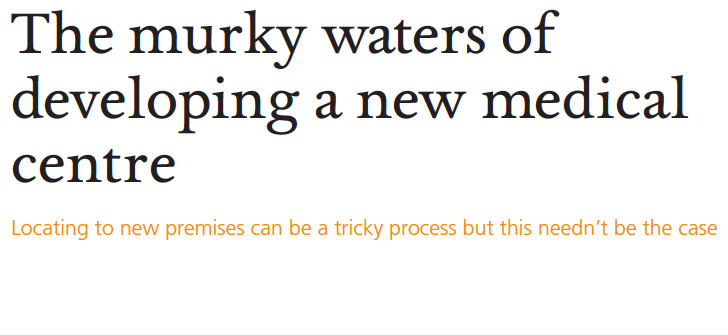
There are a significant number of GP practices wishing to locate to new premises. Numerous surgeries are too small and of inferior specification resulting in there being great difficulties for their continued occupation and use by a GP practice.
Over and above premises often being too small, the layout of premises often compromises patient confidentiality, with consulting and treatment rooms being too few in number and those that are available being too small to accommodate the ever increasing range of services required from primary care. Infection control standards and patient confidentiality are often issues that are insurmountable in older properties.
Many of these difficulties have been highlighted as practices have completed the CQC registration process, however, it needs to be borne in mind that CQC registration relates to the practice, not the property. In recent years the opportunity to develop new medical centres has reduced with the former PCTs often reluctant to engage in the development process. It is hoped that with the NHS re-organisation progressing, there will be the opportunity for new medical centres being provided.
Responsibility for paying rent to GP practices (both notional rent and rent reimbursement) falls to NHS England. This organisation in turn is structured as 27 Area Teams and it is engagement with these teams that will be critical. These Area Teams have a substantial delegated approval level; certainly more than enough to allow for the approval of new medical centres. Approval for the development of new medical centres will be dependent on business cases being prepared and approved. Most PCTs had a system of Outline Business Case and Full Business Case and it is likely that a similar system will be required by the Area Teams. The intention is for there to be some consistency between the Area Teams.
Currently different models of business cases are being reviewed, including the Five Case Model, meaning that details need to be provided as to the strategic, economic, financial, commercial and management case for the development to proceed. The significant issues to be addressed will be to identify the benefit in delivery of services and how treatment of patients will be enhanced. There will then be the financial aspects of the development. Typically a new medical centre will tend to see revenue costs to the NHS double, or even treble, those of the existing premises. An estimate of rent will be included in the Outline Business Case with this being made definite (through discussion with the District Valuer) for the Full Business Case. The enhancement in delivery of services should seek to outweigh the increase in financial costs, although this is hard to substantiate.
This leads onto the new NHS Premises Directions which came into effect in April 2013. Whilst there
is no change as to how rent is to be arrived at, there are changes as to the reimbursement of professional fees incurred by practices. The Directions now specify a greater range of advisors, including surveyors, architects and legal fees. As ever, the Directions caveat this by having regard to the budgetary targets of NHS England, however, this is an improvement.
In conclusion, there are numerous practices that will be seeking to relocate to new premises. Practices that are more visionary in their outlook will stand a greater chance of achieving their goals. Innovative ways to consider the provision of services may need to be considered in order to demonstrate the benefit in the NHS supporting new developments.

